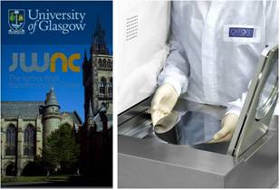Feb 18 2014
Leaders in high technology systems Oxford Instruments have recently received a multi-million pound order for a complex deposition and analysis cluster system from the James Watt Nanofabrication Centre at the University of Glasgow.

The system will enable development to improve the energy efficiency performance of electronic and optoelectronic devices for a large range of applications. Through its Plasma Technology and Omicron Nanoscience businesses, the Oxford Instruments Nanotechnology Tools business sector was able to provide the broad range of technologies necessary for this ‘Powerhouse’ multi-chamber and multi-function system.
This Oxford Instruments four chamber cluster system combines:
-
Plasma Technology’s FlexAL Atomic Layer Deposition tool used for depositing very thin films of metals, oxides and nitrides using both thermal and inductively coupled plasma (ICP) ALD processes
-
A PlasmaPro System100 ICP for etching of compound semiconductor materials
-
A PlasmaPro System100 ICP for High-Density PECVD deposition system providing for low damage, low temperature thin films
-
A Omicron Nanoscience NanoSAM LAB, for surface sensitive chemical analysis and high resolution imaging of small (micro and nano) structures by Scanning Auger Microscopy (SAM) and Scanning Electron Microscopy (SEM).
These systems will be combined in a unique configuration, and under vacuum, allowing device manufacturing and characterization measurements to be performed on device interfaces and surfaces without exposure to atmosphere. This is a very exciting development for Oxford Instruments.
They will be used in projects that will develop applications and improve the efficiencies of electronic and optoelectronic devices, and aid in the reduction of ICT energy consumption and carbon emissions. Projects include ''Silicon compatible GaN power electronics'' developing energy efficient power electronics, and ''Scalable solar thermoelectrics and photovoltaics'' where the objective is to dramatically reduce the cost of large scale exploitation of solar energy and in so-doing massively decrease the carbon dioxide emissions associated with electrical and thermal power generation.
Prof Douglas Paul, Director of the James Watt Nanofabrication Centre @ Glasgow commented:
“We chose Oxford Instruments systems for a number of reasons: our long and successful collaboration history, Oxford Instruments was the manufacturer who could integrate an analysis chamber with sub-10 nm resolution for chemical analysis (essential for many nanodevices), and also because of the very strong third-party recommendations we received about the capability of their ALD system. We are looking forward to the extensive research opportunities this system will enable.”
Mark Sefton, Sector Head for Oxford Instruments Nanotechnology Tools said:
“This substantial order from a leading British research institute is great news for us. Our group of businesses offers the research community the opportunity to integrate a range of our high technology fabrication and analysis tools, rather than having to approach multiple suppliers. Longer term benefits are that our dedicated process, service and support team will be able to offer Glasgow University the cohesive process applications and system support on the entire system that they will require.”
About Oxford Instruments plc
Oxford Instruments designs, supplies and supports high-technology tools and systems with a focus on research and industrial applications. It provides solutions needed to advance fundamental physics research and its transfer into commercial nanotechnology applications. Innovation has been the driving force behind Oxford Instruments' growth and success for over 50 years, and its strategy is to effect the successful commercialisation of these ideas by bringing them to market in a timely and customer-focused fashion.
The first technology business to be spun out from Oxford University over fifty years ago, Oxford Instruments is now a global company with over 1900 staff worldwide and is listed on the FTSE250 index of the London Stock Exchange (OXIG). Its objective is to be the leading provider of new generation tools and systems for the research and industrial sectors.
This involves the combination of core technologies in areas such as low temperature, high magnetic field and ultra high vacuum environments, Nuclear Magnetic Resonance, X-ray, electron and optical based metrology, and advanced growth, deposition and etching.
Oxford Instruments aims to pursue responsible development and deeper understanding of our world through science and technology. Its products, expertise, and ideas address global issues such as energy, environment, security and health.
About Oxford Instruments Plasma Technology
Oxford Instruments Plasma Technology offers flexible, configurable process tools and leading-edge processes for the precise, controllable and repeatable engineering of micro- and nano-structures. Our systems provide process solutions for the etching of nanometre sized features, nanolayer deposition and the controlled growth of nanostructures.
These solutions are based on core technologies in plasma-enhanced deposition and etch, ion-beam deposition and etch, atomic layer deposition, deep silicon etch and physical vapour deposition. Products range from compact stand-alone systems for R&D, through batch tools and up to clustered cassette-to-cassette platforms for high-throughput production processing.
About Oxford Instruments Omicron NanoScience
Omicron NanoScience is internationally recognised as world leaders in superconductivity, ultra low temperature cryogenic environments and the world’s leading supplier of analytical instrumentation solutions in nanotechnology research and development. We create innovative instrumentation with state-of-the-art performance and combine analytical tools into sophisticated multi-technique analytical systems.
Omicron NanoScience maintains the unique flexibility, expertise and infrastructure to develop completely new concepts to meet special customer requirements. We are a partner for our customers in research and analysis, in every respect a “scientific company“ with over twenty years of experience.
About Glasgow University
The James Watt Nanofabrication Centre @ Glasgow houses over £22M of nanofabrication tools in a 750 m2 clean room run as a pseudo-industrial operation by 14 technicians and 4 PhD level research technologists.
Glasgow has over 30 years experience of delivering micro- and nano-fabrication (and in particular electron-beam lithography) to develop solutions in processing, nanotechnology, nanoelectronics, optoelectronics, mm-wave & terahertz, bioengineering, biotechnology, lab-on-a-chip, cleantech & energy, photovoltaics, security & defence and a host of other applications.